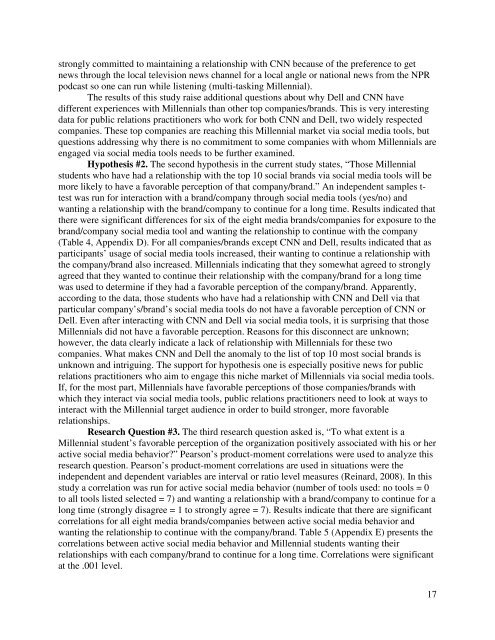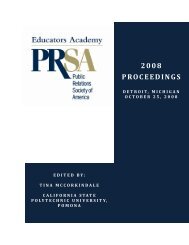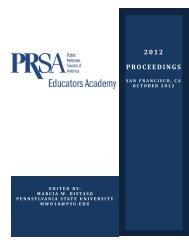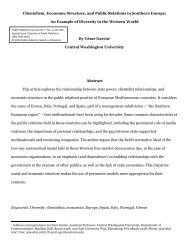2010 - Public Relations Society of America
2010 - Public Relations Society of America
2010 - Public Relations Society of America
Create successful ePaper yourself
Turn your PDF publications into a flip-book with our unique Google optimized e-Paper software.
strongly committed to maintaining a relationship with CNN because <strong>of</strong> the preference to get<br />
news through the local television news channel for a local angle or national news from the NPR<br />
podcast so one can run while listening (multi-tasking Millennial).<br />
The results <strong>of</strong> this study raise additional questions about why Dell and CNN have<br />
different experiences with Millennials than other top companies/brands. This is very interesting<br />
data for public relations practitioners who work for both CNN and Dell, two widely respected<br />
companies. These top companies are reaching this Millennial market via social media tools, but<br />
questions addressing why there is no commitment to some companies with whom Millennials are<br />
engaged via social media tools needs to be further examined.<br />
Hypothesis #2. The second hypothesis in the current study states, “Those Millennial<br />
students who have had a relationship with the top 10 social brands via social media tools will be<br />
more likely to have a favorable perception <strong>of</strong> that company/brand.” An independent samples t-<br />
test was run for interaction with a brand/company through social media tools (yes/no) and<br />
wanting a relationship with the brand/company to continue for a long time. Results indicated that<br />
there were significant differences for six <strong>of</strong> the eight media brands/companies for exposure to the<br />
brand/company social media tool and wanting the relationship to continue with the company<br />
(Table 4, Appendix D). For all companies/brands except CNN and Dell, results indicated that as<br />
participants’ usage <strong>of</strong> social media tools increased, their wanting to continue a relationship with<br />
the company/brand also increased. Millennials indicating that they somewhat agreed to strongly<br />
agreed that they wanted to continue their relationship with the company/brand for a long time<br />
was used to determine if they had a favorable perception <strong>of</strong> the company/brand. Apparently,<br />
according to the data, those students who have had a relationship with CNN and Dell via that<br />
particular company’s/brand’s social media tools do not have a favorable perception <strong>of</strong> CNN or<br />
Dell. Even after interacting with CNN and Dell via social media tools, it is surprising that those<br />
Millennials did not have a favorable perception. Reasons for this disconnect are unknown;<br />
however, the data clearly indicate a lack <strong>of</strong> relationship with Millennials for these two<br />
companies. What makes CNN and Dell the anomaly to the list <strong>of</strong> top 10 most social brands is<br />
unknown and intriguing. The support for hypothesis one is especially positive news for public<br />
relations practitioners who aim to engage this niche market <strong>of</strong> Millennials via social media tools.<br />
If, for the most part, Millennials have favorable perceptions <strong>of</strong> those companies/brands with<br />
which they interact via social media tools, public relations practitioners need to look at ways to<br />
interact with the Millennial target audience in order to build stronger, more favorable<br />
relationships.<br />
Research Question #3. The third research question asked is, “To what extent is a<br />
Millennial student’s favorable perception <strong>of</strong> the organization positively associated with his or her<br />
active social media behavior?” Pearson’s product-moment correlations were used to analyze this<br />
research question. Pearson’s product-moment correlations are used in situations were the<br />
independent and dependent variables are interval or ratio level measures (Reinard, 2008). In this<br />
study a correlation was run for active social media behavior (number <strong>of</strong> tools used: no tools = 0<br />
to all tools listed selected = 7) and wanting a relationship with a brand/company to continue for a<br />
long time (strongly disagree = 1 to strongly agree = 7). Results indicate that there are significant<br />
correlations for all eight media brands/companies between active social media behavior and<br />
wanting the relationship to continue with the company/brand. Table 5 (Appendix E) presents the<br />
correlations between active social media behavior and Millennial students wanting their<br />
relationships with each company/brand to continue for a long time. Correlations were significant<br />
at the .001 level.<br />
17
















